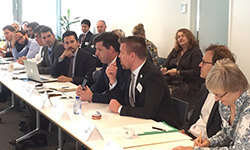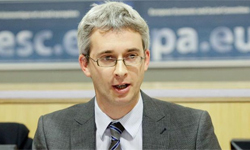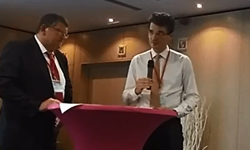BusinessEurope Headlines No. 2016-25
No future without industry
 “The EU is going through one of the most difficult moments in its history. BusinessEurope regrets that the United Kingdom chose to leave the European Union. All our member federations were strongly in favour of “remain”. Our future together is in the EU. Let’s focus on our common interests and reduce uncertainty, the enemy of growth”. “The EU must show unity and commitment to its three main economic pillars: the single market, the common trade policy and the Euro”. These were the points made by BusinessEurope President Emma Marcegaglia during the conference on the Future of Industry in Europe organised by its Portuguese member CIP, on 1 July, in Lisbon. Director General Markus Beyrer, also participating in the conference, added: “Solutions for the big challenges facing us today – be it security, migration, climate change, economic and social developments – can only be found if we work together at European level. One thing is certain: industry is part of the solution because a strong industrial base is essential for the future of Europe, a key innovator with strong spill-over effects, a motor of internationalisation and a high-quality employer. Europe simply cannot be successful without industry”
“The EU is going through one of the most difficult moments in its history. BusinessEurope regrets that the United Kingdom chose to leave the European Union. All our member federations were strongly in favour of “remain”. Our future together is in the EU. Let’s focus on our common interests and reduce uncertainty, the enemy of growth”. “The EU must show unity and commitment to its three main economic pillars: the single market, the common trade policy and the Euro”. These were the points made by BusinessEurope President Emma Marcegaglia during the conference on the Future of Industry in Europe organised by its Portuguese member CIP, on 1 July, in Lisbon. Director General Markus Beyrer, also participating in the conference, added: “Solutions for the big challenges facing us today – be it security, migration, climate change, economic and social developments – can only be found if we work together at European level. One thing is certain: industry is part of the solution because a strong industrial base is essential for the future of Europe, a key innovator with strong spill-over effects, a motor of internationalisation and a high-quality employer. Europe simply cannot be successful without industry”
Contact: Daniele Olivieri
Circular economy offers enormous opportunities for all businesses
 “Circular economy can become a real game-changer and offer enormous opportunities for all businesses along the entire value chain. The new package includes this wider perspective, which makes sense for both economic and environmental purposes” was a key message Markus J. Beyrer, BusinessEurope Director General conveyed to Daniel Calleja Crespo, Director General of DG Environment at a meeting on 28 June. BusinessEurope has called for an approach that would link the different stages and stakeholders along the full circle, while striking the right balance between different environmental and economic impacts. The business community is committed to make this agenda a success.
“Circular economy can become a real game-changer and offer enormous opportunities for all businesses along the entire value chain. The new package includes this wider perspective, which makes sense for both economic and environmental purposes” was a key message Markus J. Beyrer, BusinessEurope Director General conveyed to Daniel Calleja Crespo, Director General of DG Environment at a meeting on 28 June. BusinessEurope has called for an approach that would link the different stages and stakeholders along the full circle, while striking the right balance between different environmental and economic impacts. The business community is committed to make this agenda a success.
Contact: Alexandre Affre
CEPS afternoon session on the EU-ETS Reform
 “The EU ETS needs to be a success for all covered sectors. In order to achieve this, allowance allocation needs to be based as much as possible on real-time production data, and other measures need to be in line with this as well. BusinessEurope sees no positive aspects to the tiered approach, which is based on arbitrary thresholds that do not take into account sector-specific issues” said Alexandre Affre, Head of the Industrial Affairs department at BusinessEurope in an exchange with participants at the CEPS event. Shortly before, EU-ETS rapporteurs Ian Duncan and Frederick Federley discussed their draft proposals on the reform.
“The EU ETS needs to be a success for all covered sectors. In order to achieve this, allowance allocation needs to be based as much as possible on real-time production data, and other measures need to be in line with this as well. BusinessEurope sees no positive aspects to the tiered approach, which is based on arbitrary thresholds that do not take into account sector-specific issues” said Alexandre Affre, Head of the Industrial Affairs department at BusinessEurope in an exchange with participants at the CEPS event. Shortly before, EU-ETS rapporteurs Ian Duncan and Frederick Federley discussed their draft proposals on the reform.
Contact: Leon de Graaf
Maintaining an open dialogue - key to resolve concerns of European businesses in Russia
 Despite current challenges, Russia remains one of the most important trading partners on the EU and many European investors are established in Russia. Therefore, it is important that communication channels remain open to facilitate business operations and address concerns in areas such as technical regulations and standards. This is a perspective shared between Markus J. Beyrer, Director General of BusinessEurope and Karen Malayan, Deputy Permanent Representative of the Russian Federation to the EU who had the opportunity to meet on 4 July. BusinessEurope maintains close relations with its Russian counterparts and continues to explore different possibilities for cooperation.
Despite current challenges, Russia remains one of the most important trading partners on the EU and many European investors are established in Russia. Therefore, it is important that communication channels remain open to facilitate business operations and address concerns in areas such as technical regulations and standards. This is a perspective shared between Markus J. Beyrer, Director General of BusinessEurope and Karen Malayan, Deputy Permanent Representative of the Russian Federation to the EU who had the opportunity to meet on 4 July. BusinessEurope maintains close relations with its Russian counterparts and continues to explore different possibilities for cooperation.
Contact: Sofia Bournou
DG Beyrer writes to US Treasury regarding proposed new interest deductibility rules
 BusinessEurope Director General, Markus J. Beyrer has written to US Treasury Secretary Jack Lew setting out our concerns regarding proposed new interest deductibility rules. The letter, which was also sent to senior congressmen Orrin Hatch and Kevin Brady noted that the proposed rules announced in April would, if they became final, severely impact the ability of European companies to invest in the US and maintain normal financing activities. The letter goes on to note that concerns raised during the OECD’s Base Erosion and Profit Shifting (BEPs) project are best addressed on a coordinated and multilateral basis, with unilateral actions from national legislators to be avoided. We argue in particular, that the proposed reclassification of debt into equity is not compatible with double taxation treaties and should therefore be withdrawn.
BusinessEurope Director General, Markus J. Beyrer has written to US Treasury Secretary Jack Lew setting out our concerns regarding proposed new interest deductibility rules. The letter, which was also sent to senior congressmen Orrin Hatch and Kevin Brady noted that the proposed rules announced in April would, if they became final, severely impact the ability of European companies to invest in the US and maintain normal financing activities. The letter goes on to note that concerns raised during the OECD’s Base Erosion and Profit Shifting (BEPs) project are best addressed on a coordinated and multilateral basis, with unilateral actions from national legislators to be avoided. We argue in particular, that the proposed reclassification of debt into equity is not compatible with double taxation treaties and should therefore be withdrawn.
Read more or contact: James Watson
Promoting and reinforcing the European Social Dialogue
 "The European Social Dialogue exists for around thirty years. It has evolved with the different stages of European integration. Today, with the recent quadri-partite statement of the EU Commission, Council and EU Social Partners, there is a chance for social dialogue to play a stronger role in policy-making at EU and national levels. What is essential from an enterprise perspective is that Social Dialogue positively contributes in terms of competitiveness. We would like to discuss this key challenge more with the trade unions at all levels to make progress together on that front, thereby creating the conditions for job creation and good working conditions across Europe" said Markus J. Beyrer at the conference organised by the European Social Partners on “Promoting and reinforcing the European Social Dialogue” on 5 and 6 July in Brussels.
"The European Social Dialogue exists for around thirty years. It has evolved with the different stages of European integration. Today, with the recent quadri-partite statement of the EU Commission, Council and EU Social Partners, there is a chance for social dialogue to play a stronger role in policy-making at EU and national levels. What is essential from an enterprise perspective is that Social Dialogue positively contributes in terms of competitiveness. We would like to discuss this key challenge more with the trade unions at all levels to make progress together on that front, thereby creating the conditions for job creation and good working conditions across Europe" said Markus J. Beyrer at the conference organised by the European Social Partners on “Promoting and reinforcing the European Social Dialogue” on 5 and 6 July in Brussels.
Contact: Guillaume Cravero
New position paper on public country-by-country reporting of tax information
 BusinessEurope this week released a new position paper setting out our concerns regarding the European Commission’s proposals for tax information reported by companies (CBCR) to be made public. Speaking at an event at the European Economic and Social Committee on 6 July, James Watson, Director of Economics set out the key points from the paper. Whilst BusinessEurope supports the fight against tax fraud and evasion, requiring tax and financial information reported by companies to be made public could both be counter-productive and reduce EU competitiveness. Noting the importance that tax authorities have access to such information to enable them to enforce tax rules, James argued that making information public both undermines our confidence in tax authorities and jeopardies the willingness of other countries to implement the OECD agreement around information sharing between tax authorities. We will continue to raise these concerns in the coming month amongst members of both European Parliament and the ECOFIN Council.
BusinessEurope this week released a new position paper setting out our concerns regarding the European Commission’s proposals for tax information reported by companies (CBCR) to be made public. Speaking at an event at the European Economic and Social Committee on 6 July, James Watson, Director of Economics set out the key points from the paper. Whilst BusinessEurope supports the fight against tax fraud and evasion, requiring tax and financial information reported by companies to be made public could both be counter-productive and reduce EU competitiveness. Noting the importance that tax authorities have access to such information to enable them to enforce tax rules, James argued that making information public both undermines our confidence in tax authorities and jeopardies the willingness of other countries to implement the OECD agreement around information sharing between tax authorities. We will continue to raise these concerns in the coming month amongst members of both European Parliament and the ECOFIN Council.
Read more or contact: James Watson
Digitalisation – opportunities not only for business, but also for workers
 "Digitalisation offers opportunities for companies - new forms of communication and production and increased efficiency in business operations. But it also offers opportunities for workers - more autonomy and flexibility in work organisation, more possibilities to balance work and private life and new job opportunities." This was the main message of Maxime Cerutti, BusinessEurope Director for Social Affairs at a conference organised by the European Trade Union Institute and European Trade Union Confederation on “shaping the new world of work”. BusinessEurope emphasised the important role of Social Partners at all levels to contribute to an employment policy agenda which underpins the digital transformation of our economies and labour markets and does not stifle innovation. On the issue of health and safety, BusinessEurope pointed out that “as usual, employers and workers will have to adapt to trends in this field, to see what it means in terms of risk prevention and encourage communication between management and workers.”
"Digitalisation offers opportunities for companies - new forms of communication and production and increased efficiency in business operations. But it also offers opportunities for workers - more autonomy and flexibility in work organisation, more possibilities to balance work and private life and new job opportunities." This was the main message of Maxime Cerutti, BusinessEurope Director for Social Affairs at a conference organised by the European Trade Union Institute and European Trade Union Confederation on “shaping the new world of work”. BusinessEurope emphasised the important role of Social Partners at all levels to contribute to an employment policy agenda which underpins the digital transformation of our economies and labour markets and does not stifle innovation. On the issue of health and safety, BusinessEurope pointed out that “as usual, employers and workers will have to adapt to trends in this field, to see what it means in terms of risk prevention and encourage communication between management and workers.”
Contact: Rebekah Smith
How to ensure enforcement of sustainable development provisions in trade agreements
 “Monitoring by the civil society is only the first step towards enforcement” said Eleonora Catella at the public hearing organised by the Economic and Social Committee (EESC) on 30 June in Brussels. To draft its own-initiative opinion "The position of the EESC on specific key issues of TTIP negotiations", sustainable development, services, regulatory cooperation, the Investment Court System, technical barriers to trade as well as sanitary and phyto-sanitary measures were discussed. Furthermore, enforcement of the sustainable development chapter in TTIP, including the possibility to impose trade sanctions in case of violation of labour or environmental provisions were also part of the hearing.
“Monitoring by the civil society is only the first step towards enforcement” said Eleonora Catella at the public hearing organised by the Economic and Social Committee (EESC) on 30 June in Brussels. To draft its own-initiative opinion "The position of the EESC on specific key issues of TTIP negotiations", sustainable development, services, regulatory cooperation, the Investment Court System, technical barriers to trade as well as sanitary and phyto-sanitary measures were discussed. Furthermore, enforcement of the sustainable development chapter in TTIP, including the possibility to impose trade sanctions in case of violation of labour or environmental provisions were also part of the hearing.
Contact: Eleonora Catella
A new European Innovation Council? First things first
 Strong and immediate action to strengthen research & innovation efforts is urgently needed in Europe, while setting up a new institution - the “European Innovation Council” - might not be among the main priorities now. This was a key conclusion made by Jan Bambas, Adviser at BusinessEurope at the conference on a European Innovation Council, organized by the Group of R&D Italian Liaison Offices and the Italian business federation Confindustria at the European Parliament on 28 June. Bambas underlined that first things have to come first: An innovation-friendly regulatory framework, the efficient use of funding and stronger innovation ecosystems in Europe to address the innovation and investment needs of European citizens and companies. If this is given a priority, BusinessEurope would be open to the idea of a new strategic body for innovation, Bambas said.
Strong and immediate action to strengthen research & innovation efforts is urgently needed in Europe, while setting up a new institution - the “European Innovation Council” - might not be among the main priorities now. This was a key conclusion made by Jan Bambas, Adviser at BusinessEurope at the conference on a European Innovation Council, organized by the Group of R&D Italian Liaison Offices and the Italian business federation Confindustria at the European Parliament on 28 June. Bambas underlined that first things have to come first: An innovation-friendly regulatory framework, the efficient use of funding and stronger innovation ecosystems in Europe to address the innovation and investment needs of European citizens and companies. If this is given a priority, BusinessEurope would be open to the idea of a new strategic body for innovation, Bambas said.
Contact: Jan Bambas
Calendar
 8-9 July 2016: EU-US mini summit at NATO summit in Warsaw
8-9 July 2016: EU-US mini summit at NATO summit in Warsaw- 11-15 July 2016: 14th TTIP Negotiation Round in Brussels
- 12 July 2016: Meeting of Eurogroup and ECOFIN Council
- 12-13 July 2016: 11th EU-China business summit in Beijing